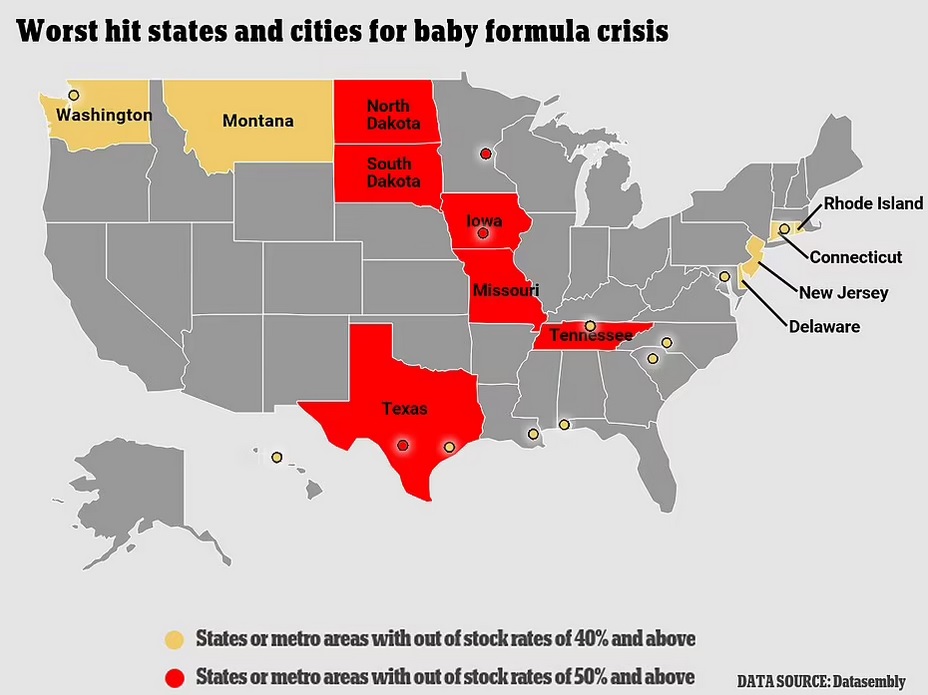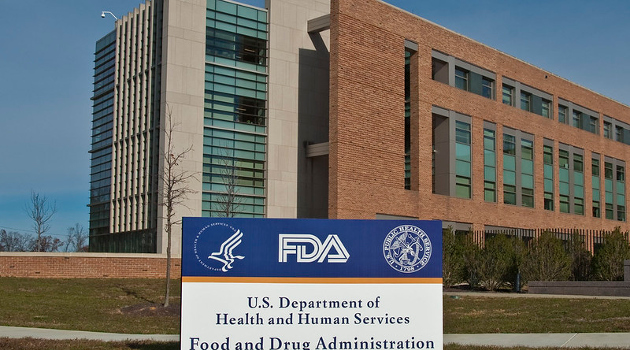While I definitely criticized the Food and Drug Administration for its many mistakes during the pandemic, I only made passing reference to that bureaucracy when referencing the shortage of baby formula during the concluding portion of a recent program.
And even that mention was not negative.
I was vaguely aware that the FDA had temporarily shut down a factory in Michigan because of concerns about bacteria in formula. And even a curmudgeonly libertarian like me did not view that as being a bad thing.
So I basically assumed that the severe shortages depicted in this map were mostly the result of bad luck.

But I should have known that bad government policy also played a big role.
The above map comes from an article for Reason by Jonathan Alder. Here’s some of what he wrote.
…if you’re having a hard time finding infant formula, you can thank Uncle Sam. …a combination of arguably well-intentioned policies have combined to magnify the effects of the Abbott recall and prevent American consumers from having access to alternative supplies. These include tariffs and quotas on infant formula imports, Food and Drug Administration regulations, and other government policies that both constrain imports and reduce the incentive for foreign producers in countries like Canada to invest in production that could help serve the American market. …There are steps the government could take to ease the shortage, such as removing or temporarily suspending FDA rules that bar the importation of infant formula from countries. …Infant formula that is perfectly safe and that is produced in accordance with European standards that are at least as stringent as US health and safety requirements, cannot be imported because the FDA has not reviewed and approved what is printed on the package, which is a costly and time-consuming process for producers.
The Wall Street Journal opined on the topic as well.
By now you’ve heard that some 40% of the nation’s baby formula is out of stock… This should never happen in America. How did it? Here’s the government part of the story you won’t hear from the political class. …the market is so concentrated is tariffs up to 17.5% on imports, which protect domestic producers from foreign competition. Non-trade barriers such as FDA labeling and ingredient requirements also limit imports even during shortages. …the Trump Administration sought to protect domestic producers by imposing quotas and tariffs on Canadian imports in the USMCA trade deal. …America’s baby-formula shortage illustrates how bigger government can make big business bigger, thereby limiting competition and choice.
Jon Miltimore, writing for the Foundation for Economic Education, further criticized government policy in this area.
…the government itself is primarily responsible for the baby formula shortage. …the New York Times…reported in March 2021, “baby formula is one of the most tightly regulated food products in the US, with the Food and Drug Administration (FDA) dictating the nutrients and vitamins, and setting strict rules about how formula is produced, packaged, and labeled.” …many American parents buy “unapproved” European formula even though…it’s technically against the law. …On this black(ish) market, it turns out Americans are willing to pay big bucks for European formula. …At times, these nefarious black market imports have resulted in high profile busts, like in April 2021 when US Customs and Border Protection agents in Philadelphia seized 588 cases of baby formula (value: $30,000) that violated the FDA’s “import safety regulations.” Some may contend that the FDA is simply keeping Americans and their babies safe—which is no doubt what regulators want you to believe—but this overlooks an inconvenient fact: despite the FDA’s efforts, Americans are consuming vast amounts of black market baby formula, and the children are doing just fine.
Robby Soave also addressed the issue for Reason.
U.S. officials could have made such shortages less likely by approving baby formula that is widely available in Europe, but per usual, the Food and Drug Administration (FDA) has other priorities. The agency has a long history of taking forever—years and years and years—to approve foods and medications that European officials have already decided are perfectly safe for human consumption. …This is yet another in a long line of failures: Both the FDA and the Centers for Disease Control and Prevention (CDC) screwed up the early approval process for COVID-19 testing. …The FDA should really stop erecting regulatory hurdles that make it harder for working-class parents to feed their families.
I don’t know if the FDA has been over-zealous in closing the Abbott plant in Michigan, so I won’t comment on that issue.
But I do know that imposing trade taxes on imports of baby formula is a bad idea.
And I know it’s also a bad idea to deny Americans the freedom to buy European-produced baby formula, especially since FDA bureaucrats simply don’t like certain labels.
Indeed, I’ll close by making the key point that we should have “mutual recognition” policies with other advanced nations. In other words, we should start with the default assumption that consumers have the right to buy goods from countries such as Japan, Netherlands, Australia, and the United Kingdom.
This type of “good globalism” should be part of well-designed free-trade agreements with peer countries.
P.S. Mutual recognition also allows for regulatory diversity, which reduces systemic risk.
———
Image credit: The U.S. Food and Drug Administration | U.S. Government Works.





